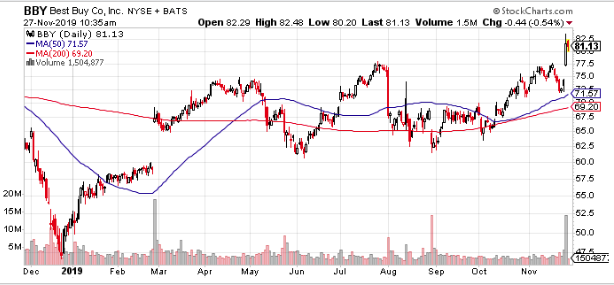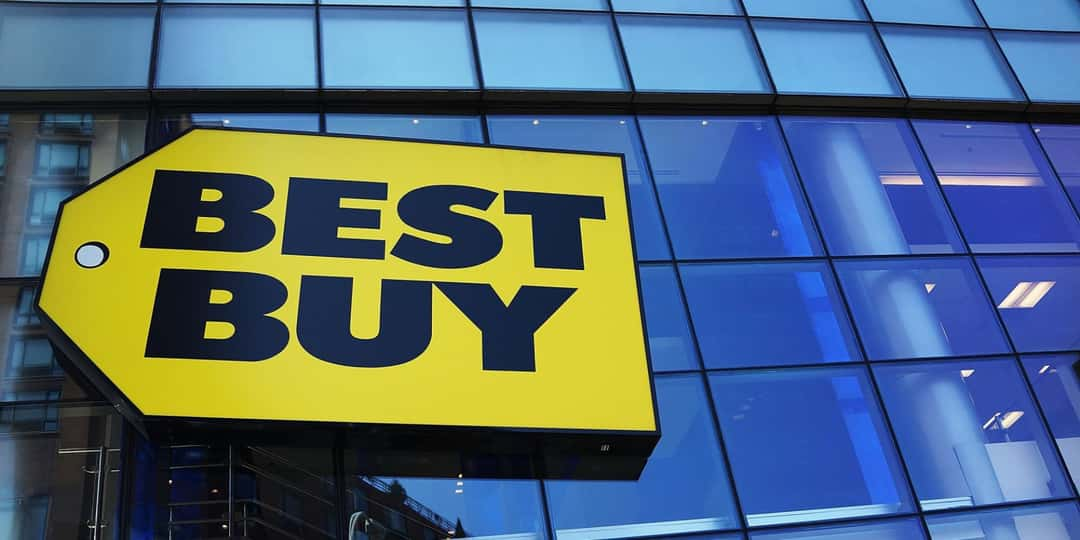Shares of Best Buy (BBY) surged some 10% to an intraday and new 52-week high of $83.60 after the electronics and home appliance retailer posted better-than-expected earnings and raised guidance.
The company now expects full-year EPS of $5.81 to $5.91 vs. prior estimates of $5.60 to $5.75 prior view and $5.76 consensus. Best Buy also sees full-year enterprise comparable sales growth of +1% to +2% vs. +0.70% to +1.70% prior view.
The stock is now up 58% for the year-to-date, more than doubling the broader market as measured by the SPDR S&P 500 (SPY).

With a good holiday season now already priced into the shares, the question is whether Best Buy is still a good deal for investors.
This recent earnings season highlighted the continued divergence of winners from losers in the retailing sector.
With overall consumer spending strong, companies could not blame the economy and results were a reflection of each specific company’s business model and operational execution.
To be blunt, there are those that have risen to the challenge of Amazon (AMZN) by developing and integrating online shopping and those that have not.
Best Buy is clearly in the former camp. It has managed to shift from its stores simply being “showrooms” people browsed before making a purchase, from a competitor online, to leveraging the physical locations as distribution centers as offering customer support that provides services such as product education and installation.
In this sense, Best Buy has borrowed and implemented some of the most effective strategies of other companies; its Geek Squad is similar to Apple’s (AAPL) genius bar. Through its Total Tech Support membership program, it offers is similar to Amazon’s Prime offering and offering customers the options of traditional shopping in the store, to strictly delivering to the hybrid of ordering online and picking up at the store — taking a page from Walmart’s (WMT) and Target’s (TGT) successful omnichannel approach.
Several analysts have noted that there is not any real game-changing blockbuster or must-have electronic device for this holiday season. In a counterintuitive way, this may actually help Best Buy as it won’t be competing with the big three, AMZN, TGT and WMT, which would use a high profile to lure people to their sites and stores. Instead, Best Buy is likely to benefit from consumers turning to them as the default choice for their electronics purchases.
Despite the incredible run, the stock has enjoyed the shares still being cheap on various valuation metrics. With earnings for 2020 expected to be $5.90, it trades at just 13.5x forward estimates. It also offers a solid 2.6% dividend yield.
The stock may need to rest and consolidate after the recent surge. But, I think best Buy is a strong buy for the coming year.
BBY shares were trading at $80.23 per share on Wednesday afternoon, down $1.34 (-1.64%). Year-to-date, BBY has gained 54.88%, versus a 27.92% rise in the benchmark S&P 500 index during the same period.
About the Author: Option Sensei

Steve has more than 30 years of investment experience with an expertise in options trading. He’s written for TheStreet.com, Minyanville and currently for Option Sensei. Learn more about Steve’s background, along with links to his most recent articles. More...
More Resources for the Stocks in this Article
| Ticker | POWR Rating | Industry Rank | Rank in Industry |
| BBY | Get Rating | Get Rating | Get Rating |






